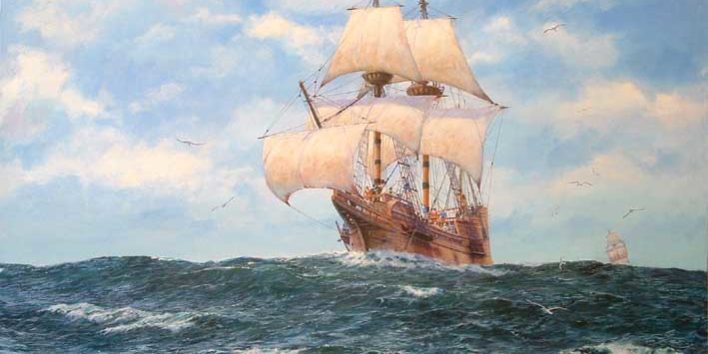The historic voyage of the Mayflower began on Wednesday, September 6 (new style the 16th) as it departed Plymouth harbor in England. There was now one ship, the Speedwell having been sold and twenty remaining in England, probably returning to London or Leyden. Bradford writes: “These troubles being blown over, and now all being compact together in one ship, they put to sea again with a prosperous wind, which continued divers days together, which was some encouragement unto them; yet, according to the usual manner, many were afflicted with seasickness.” The voyage would prove to be 66 days in cramped conditions, and seasickness was only a minor part of the drama!
The first incident recorded by William Bradford on the voyage was of “a proud and very profane young man, one of the seamen, of a lusty, able body, which made him the more haughty; he would always be contemning the poor people in their sickness and cursing them daily with grievous execrations; and did not let to tell them that he hoped to help to cast half of them overboard before they came to their journey’s end, and to to make merry with what they had; and if he were by any gently reproved, he would curse and swear most bitterly.”
The Pilgrims embraced the doctrine of God’s Sovereignty, also termed His Providence. This meant they believed everthing, including tragedies, was under His control or allowance. They words like “pleased” to indicate His allowance, not that God was personally pleased with tragedy or death. Thus, Bradford concludes this incident with: “But it pleased God before they came half seas over, to smite this man young man with a grievous disease, of which he died in a desperate manner, and so was himself the first that was thrown overboard. Thus his curses light on his own head, and it was an astonishment to all his fellows for they noted it to be the just hand of God upon him.”
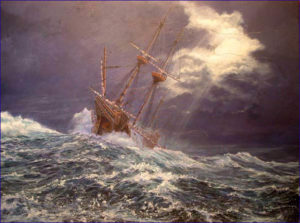 Then the storms came, however. “They were encountered many times with cross winds and met with many fierce storms with which the ship was shroudly shaken, and her upper works made very leaky; and one of the beams in the midships was bowed and cracked, which put them in some fear that the ship could not be able to perform the voyage…. Perceiving the mariners to fear the sufficiency of the ship as appeared by their mutterings, they entered into serious consultation with the master and other officers of the ship, to consider in time of the danger, and rather to return than to cast themselves into a desperate and inevitable peril.” Then, an amazing providence occurred that allowed them to continue their voyage. “…There was a great iron screw the passengers brought out of Holland, which would raise the beam into his place; the which being done… they committed themselves to the will of God and resovled to proceed.” This iron screw, which some have supposed was part of a printing press was more likely a jack to raise roofs on their houses.
Then the storms came, however. “They were encountered many times with cross winds and met with many fierce storms with which the ship was shroudly shaken, and her upper works made very leaky; and one of the beams in the midships was bowed and cracked, which put them in some fear that the ship could not be able to perform the voyage…. Perceiving the mariners to fear the sufficiency of the ship as appeared by their mutterings, they entered into serious consultation with the master and other officers of the ship, to consider in time of the danger, and rather to return than to cast themselves into a desperate and inevitable peril.” Then, an amazing providence occurred that allowed them to continue their voyage. “…There was a great iron screw the passengers brought out of Holland, which would raise the beam into his place; the which being done… they committed themselves to the will of God and resovled to proceed.” This iron screw, which some have supposed was part of a printing press was more likely a jack to raise roofs on their houses.
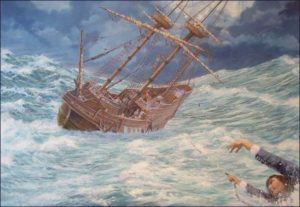 Another providential event occurred when John Howland, indentured servant to John Carver and about 28 years of age, “coming upon some occasion above the ratings was, with a seele (or pitch) of the ship, thrown into sea; but it pleased God that he caught hold of the topsail halyards which hung overboard and ran out at length. Yet he held his hold (though he was sundry fathoms under water) till he was hauled up by the same rope to the brim of the water, and then with a boat hook and other means got into the ship again and his life saved. And though he was something ill with it, yet he lived sundry years after and became a profitable member both in church and commonwealth.”
Another providential event occurred when John Howland, indentured servant to John Carver and about 28 years of age, “coming upon some occasion above the ratings was, with a seele (or pitch) of the ship, thrown into sea; but it pleased God that he caught hold of the topsail halyards which hung overboard and ran out at length. Yet he held his hold (though he was sundry fathoms under water) till he was hauled up by the same rope to the brim of the water, and then with a boat hook and other means got into the ship again and his life saved. And though he was something ill with it, yet he lived sundry years after and became a profitable member both in church and commonwealth.”
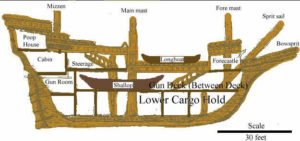 Keep in mind that the passengers were kept in the “between decks.” The Shallop was used for sleeping as well and had to be put back together once landing. The cramped quarters for 102 passengers, many of them having to share a small bed, meant that sickness spread quickly. Since the Mayflower was a wine ship it had soaked the beams and thus kept the death rate from being much higher. This has also been noted as the Providence of God. Due to their mission and purpose, we can suppose that psalm singing, reading of the Scriptures, telling stories of God’s care and Providence, as well as the children playing games, kept everyone as busy as possible.
Keep in mind that the passengers were kept in the “between decks.” The Shallop was used for sleeping as well and had to be put back together once landing. The cramped quarters for 102 passengers, many of them having to share a small bed, meant that sickness spread quickly. Since the Mayflower was a wine ship it had soaked the beams and thus kept the death rate from being much higher. This has also been noted as the Providence of God. Due to their mission and purpose, we can suppose that psalm singing, reading of the Scriptures, telling stories of God’s care and Providence, as well as the children playing games, kept everyone as busy as possible.
One passenger, William Button, indentured servant to Samuel Fuller, died when they drew near the coast. Of the eighteen women who boarded the Mayflower, three were at least six months pregnant! Elizabeth Hopkins gave birth to Oceanus about half way over, but he died nine months later. Susannah White gave birth to Peregrine in Provincetown Harbor, and he lived until 1704! Mary Allerton gave birth to a stillborn in Provincetown Harbor. The 66 day voyage took a toll on everyone, but the women and children deserve much more notoriety and appreciation than they have often received for their character! Of the 102 passengers, one died during the voyage and one baby was born.
Bradford then writes “But to omit other things (that I may be brief) after long beating at sea they fell with that land which is called Cape Cod; the which being made andd certainly known to be it, they were not a little joyful.” 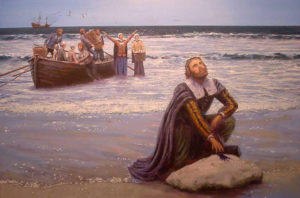 It was early in the morning on Thursday, November 9 when they sighted land. After writing the Mayflower Compact on Saturday the 11th, they held their first church service on board the ship on Sunday the 12th. Then, on Monday the 13th, “Being thus arrived in a good harbor, and brought safe to land, they fell upon their knees and blessed the God of Heaven who had brought them over the vast and furious ocean, and delivered them from all the perils and misereis thereof, again to set their feet on the firm and stable earth, their proper element.”
It was early in the morning on Thursday, November 9 when they sighted land. After writing the Mayflower Compact on Saturday the 11th, they held their first church service on board the ship on Sunday the 12th. Then, on Monday the 13th, “Being thus arrived in a good harbor, and brought safe to land, they fell upon their knees and blessed the God of Heaven who had brought them over the vast and furious ocean, and delivered them from all the perils and misereis thereof, again to set their feet on the firm and stable earth, their proper element.”
Let us teach our children and grandchildren of the character required to make this voyage. May we also be as grateful and thank Him that the presence of women and children; families, that became the hallmark and foundation for our nation. Let us thank Him for the silver lining of good that He brings forth after taking us through the storms of life! William Bradford recorded such events “That their children may see with what difficulties their fathers wrestled in going through these things in their first beginnings, and how God brought them along.”

